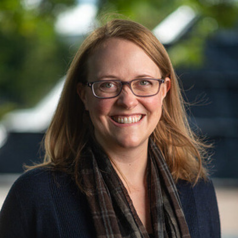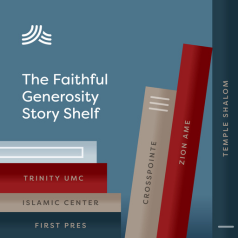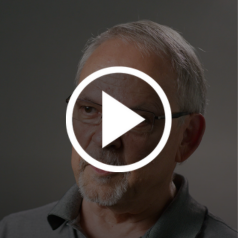Wave II of the National Study of Congregations’ Economic Practices
Wave II of the National Study of Congregations’ Economic Practices
By Erica Dollhopf, Ph.D., Associate Director of Research & David P. King, Ph.D., Karen Lake Buttery Director and Associate Professor, Philanthropic Studies
Introduction
Do you ever wonder how virtual worship impacts giving? Or, do you know what percentage of congregations offer a QR code during religious services for members to contribute? Wave II of the National Study of Congregations’ Economic Practices (NSCEP) seeks to answer these questions and more, as it explores how congregational life and financial practices have changed in the 7 years, since our first study was conducted in 2018.
NSCEP stands as the most comprehensive, in-depth, and rigorous study of congregational finances in a generation. The study’s second wave, which was launched in May, follows up with the same 1,200 congregations that participated in Wave 1, back in 2018, and spans dozens of denominations and faith groups. We anticipate we will find notable shifts in congregations’ financial practices in these intervening years, particularly with the changes from the pandemic that impacted so many aspects of congregational life and accelerated the introduction of now-common congregational features such as virtual worship and electronic giving options. We will also know what percentages of congregations may have closed, or if they have grown or shrunk in attendees, staff size, or annual budgets. And we’ll be able to observe not only the ways in which resources come into a congregation, but also how they are managed and where they go. Congregations remain vital to the lives of almost all of our local communities, and how they engage is a question that we’ll be able to make sense of as well.
What we hope to learn
Our overall goal with NSCEP seeks to provide a comprehensive assessment of the economic practices of congregations in the U.S. by examining their theological, cultural, and practical orientations toward money and by generating a deeper understanding of how congregations receive, manage, and spend their financial resources.
To put it succinctly, the focus of the NSCEP can be summarized in the following core research questions.
- Overview of Finances: What is the financial state of congregations in the United States?
- Orientations toward Money: What are congregations’ theological, cultural, and practical orientations toward money and economic practices?
- Receive: What are the modes, forms, and practices through which congregations obtain financial resources?
- Manage: How do congregations teach about money and finances, and how do they steward the gifts they receive?
- Spend: How do congregations utilize their financial resources to serve their members, community, and beyond?
Why this study is important for congregations, religious leaders, and the nonprofit sector
How congregations receive, manage, and spend resources are issues that religious leaders are eager to discuss but often lack comprehensive information to fully grasp the current landscape. With changes in the ways in which Americans are affiliating with religious traditions, joining congregations, and attending religious services, as well as the evolving ways in which religious Americans give and the role that congregations play in our life together, it is vital for us to understand these trends more deeply.
We hope that this study will be a resource for congregations and their leaders to understand their current financial information in context with congregations overall and make data-informed decisions that will support their congregations’ economic health and vitality. In addition to being informative, the data might also inspire new thinking around current practices – for instance, clergy may explore strategies from other congregations around areas such as long-term planned giving options or special offerings and share these ideas with their finance and stewardship teams for consideration.
What’s next
The survey was sent to congregations in mid-May. Since then, we have been following up with congregations via email and phone to share information about the survey and answer questions about the survey and completion process. We anticipate beginning the data cleaning and analysis process in early fall and having initial results to share in early 2026.
If you are one of the partner congregations, we are grateful for your participation in the survey process! We are looking forward to sharing our latest insights and best practices with all congregations and faith leaders in 2026. We see the NSCEP continuing to be the resource for advancing knowledge among scholars of religion, philanthropy, and congregations, while serving as a reliable source of empirical data for religious leaders to enhance their stewardship programming, increase their confidence in engaging these financial topics, and raising awareness of the centrality of these economic issues for the future of American religious life.
Expanded Perspective: How Research Impacts Religious Work
By Meredith McNabb, Associate Director of Education
 “Oh, thank you for meeting with me today, Pastor. I’m worried about my spouse’s job and my retirement; I want to know the church’s future; and I’m grieving the state of the world. Can you help?”
“Oh, thank you for meeting with me today, Pastor. I’m worried about my spouse’s job and my retirement; I want to know the church’s future; and I’m grieving the state of the world. Can you help?”
“Absolutely. I’ll get back to you after I do some research. See you soon!”
This isn’t how the conversation starts—or ends, we hope—but congregational leaders know those moments that spring up and touch on the biggest things in our people’s lives and in our faith commitments. In theological education and pastoral formation, we encourage clergy to be forthright about ‘knowing what they don’t know’, but we also expect that divine blessing, holy study, and inherent wisdom are going to be present in our leaders as they respond to the tough questions when they matter most, whether at the coffee shop or the hospital bedside or the direct message on social media.
Research, in the academic sense of careful footnotes about primary documents or advanced statistical work, rarely plays a huge role in how congregational leaders do their work. Rigorous, reliable research can be inaccessible—hidden in dissertations or behind paywalls, or cloaked in such dense language that few beyond the experts can appreciate. It can also be inapplicable—hard to translate into meaningful elements in pastoral conversations or sermons or congregational leadership decisions.
That’s one reason why Lake Institute on Faith and Giving exists: to collect, curate, and/or direct reliable research in meaningful ways for congregational and denominational leaders.
But it also takes a mindset shift from those leaders and from those who support them: We have to find a middle ground between a leader frozen without an expert to quote and a leader who truly believes that ‘the plural of anecdote is data’.
Ministry leaders are asked to be experts in everything from ethics to management to maintenance, with some insight into psychology, fundraising, and science along the way—and what we’re mostly trained for is theology and scripture and polity. Developing networks of “smart people”, as a mentor of mine calls them, who can resource one’s ministry in far-flung subjects helps, as does cultivating a habit of broad reading and continuing education. Another mentor used to keep the words of Richard of St. Victor—12th century mystical theologian that he was—as an email signature: “Learn everything—you will find later that nothing is superfluous.”
But learning to access, evaluate, and utilize what we can learn from research is important, too. So much of how congregational leaders exercise their leadership winds up based in inertia, rumor, gut instinct, or what the person who spoke to us last—or loudest—happened to say.
Trustworthy research, instead, can help us get ourselves grounded in an accurate picture of conditions. The thought that “our congregation’s neighborhood doesn’t have children” can be checked by such simple research as a conversation with the nearest elementary school principal, or by such sophisticated research as census information or one of the zip-code-based demographic data products.
“Most of our giving comes in in December” may be a thought that gives comfort during a low summer month—but careful research into month-by-month giving patterns from previous years could bring a more nuanced picture to test out that hypothesis early enough to adjust plans.
“Young people today want ____” is a cottage industry for commentary—but doing the research in both the literature and among one’s own youngest members or neighbors, perhaps in intentional focus group conversations, helps to validate what might be accurate and what might be just hype in your context.
Reliable research also gives us the tools to deal more fruitfully with issues of true disagreement. An objective point of data to look at together can help other leaders join in discernment work. Basing that work from a common set of (accurate) facts, rather than engaging in a battle of persuasiveness, is going to build a more positive process—not to mention come to what we trust will be wiser results.
Story Shelf: Where Are They Now?
 Some of the stories on The Faithful Generosity Story Shelf have been unfolding for several years now. This prompts us to ask: Where are they now? We wonder how these congregations and organizations have expanded their efforts, responded to challenges, or begun to dream of something new. Explore two new follow-up stories below.
Some of the stories on The Faithful Generosity Story Shelf have been unfolding for several years now. This prompts us to ask: Where are they now? We wonder how these congregations and organizations have expanded their efforts, responded to challenges, or begun to dream of something new. Explore two new follow-up stories below.
Gift of Land Becomes $100k for Community: READ MORE
Paying Reparations, Building Relationships: READ MORE
Lake Institute in Partnership
 In this video, Beryl Jantzi, D. Min., Director of Stewardship Education at Everence, explains Lake Institute’s commitment to deepening understanding around the intersection of faith and philanthropy through research, teaching, and programming. Watch this video to learn more about how Lake Institute fosters conversations to help faith leaders and communities navigate the shifting landscape of faith and giving.
In this video, Beryl Jantzi, D. Min., Director of Stewardship Education at Everence, explains Lake Institute’s commitment to deepening understanding around the intersection of faith and philanthropy through research, teaching, and programming. Watch this video to learn more about how Lake Institute fosters conversations to help faith leaders and communities navigate the shifting landscape of faith and giving.
Subscribe
Insights is a bi-weekly e-newsletter for the religious community and fundraisers of faith-based organizations that provides:
- Reflections on important developments in the field of faith and giving
- Recommended books, studies and articles
- Upcoming Lake Institute events
